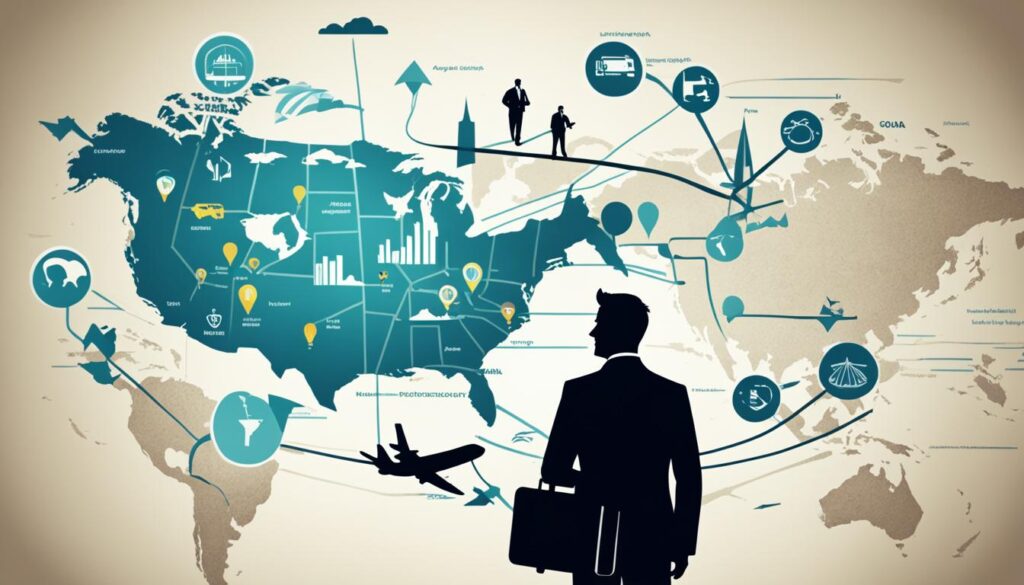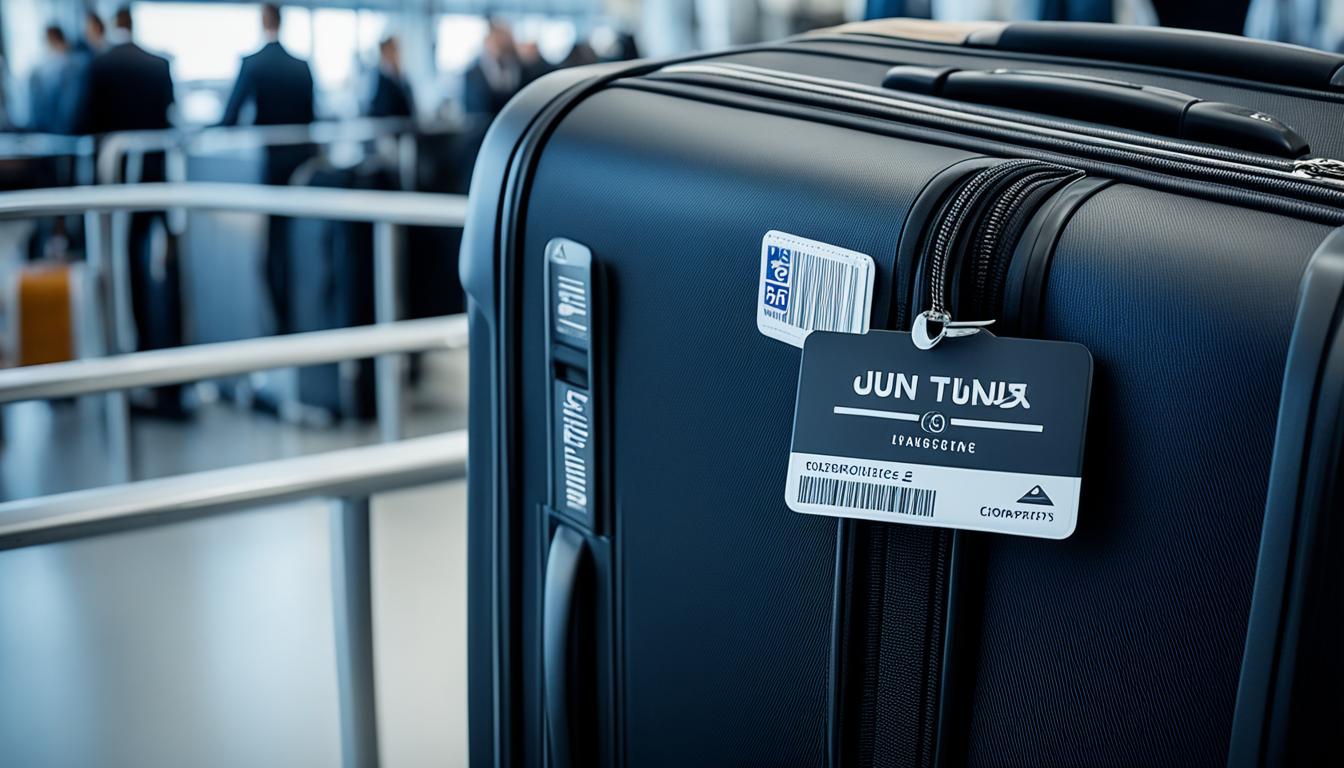How can business travelers strike the perfect balance between efficiency and comfort while on the road? Business travel blends the need for efficiency with the challenges of being out of the office.
Business professionals often view it both as a perk and a nuisance due to unpredictable elements like delays or lost luggage. Adhering to your company’s travel policies provides essential structure, from booking preferences to expense reimbursement processes. Embracing efficient packing techniques, such as using carry-ons only and keeping essentials ready-packed, can save valuable time. Understanding and leveraging loyalty programs, maintaining a priority for personal comfort, staying charged, and selecting non-stop flights enhance the overall travel experience. Preparedness, from using suit bags to downloading helpful apps, ensures you are ready for the most common travel complications.
Key Takeaways
- Business travel blends efficiency with out-of-office challenges.
- Adhering to travel policies provides essential structure.
- Efficient packing saves time and reduces hassle.
- Loyalty programs and non-stop flights enhance comfort.
- Using helpful apps ensures readiness for travel complications.
Packing Like a Pro
Efficient packing techniques are crucial for every business traveler aiming to streamline their business trips. Mastering the art of packing can significantly enhance travel efficiency, letting you focus on business priorities rather than logistics.
Efficient Packing Techniques
Rolling clothes tightly and utilizing space-saving items like packing cubes can maximize luggage space. By strategically organizing your suitcase, you ensure both accessibility and tidiness. This method not only eases travel booking processes but also reduces the chances of forgetting essential items.
- Selective rolling and folding of clothes
- Utilizing packing cubes
- Prioritizing essential items
Tech Essentials
Staying connected and productive on business trips requires careful selection of tech essentials. Power banks, international adapters, and backup data storage should be prioritized. These items are indispensable for ensuring that your devices remain charged and functional regardless of your destination.
Wardrobe Selection
Selecting versatile, wrinkle-resistant clothing that can transition from professional meetings to casual outings is key. This approach minimizes the number of items needed, making the travel booking process smoother and your suitcase lighter. Think in terms of mix-and-match pieces that adapt to various scenarios.
- Wrinkle-resistant fabrics
- Neutral color palettes
- Multi-functional shoes
Health Kit
A well-thought-out health kit is an essential part of business trips. This kit should include personal toiletries, hand sanitizers, masks, and basic medication. Being prepared for health-related issues grants peace of mind, ensuring you can focus on your professional tasks.
Keep these essentials in your health kit:
| Item | Purpose |
|---|---|
| Hand Sanitizer | Maintains hygiene |
| Masks | Health safety |
| Basic Medication | Prevents common ailments |
| Personal Toiletries | Daily hygiene needs |
Navigating Through Airports with Ease
Streamlining your airport experience can significantly impact the success of your business trips. From leveraging loyalty programs to mastering security checks and navigating airport layouts efficiently, these strategies can reduce travel-related stress and optimize your transit phase.
Loyalty Programs
Frequent flyer programs and travel rewards offer tangible benefits that enhance your airport experience. These programs provide access to airport lounges, priority boarding, and expedited security checks. By enrolling in loyalty programs, you can make your travel arrangements more efficient, ensuring that each step of your journey is optimized for convenience and comfort.
Security Checks
Security checks can often be the most time-consuming part of your airport experience. To improve efficiency, wear easily removable shoes and keep your electronics accessible. Utilizing TSA PreCheck or Global Entry can further expedite this process. These programs, integral to effective travel management, streamline your passage through security, allowing you to spend more time focusing on your business objectives.
Airport Navigation
Understanding airport layouts can greatly reduce travel stress. Utilize apps and digital tools to familiarize yourself with airport maps, amenities, and navigation tips before arrival. These resources help you locate essential services such as lounges, gates, and transport connections swiftly, making your travel arrangements smoother and more predictable. Confidence in navigating through airports ensures you can concentrate on your professional duties without unnecessary disruptions.
| Loyalty Program | Benefits | Examples |
|---|---|---|
| Frequent Flyer Programs | Priority Boarding, Extra Baggage Allowance, Lounge Access | American Airlines AAdvantage, Delta SkyMiles |
| TSA PreCheck | Expedited Security Screening | TSA PreCheck |
| Global Entry | Expedited Entry into the U.S. | Global Entry |
Maintaining Productivity On-the-Go
For professionals, maintaining productivity while traveling is essential. Embracing digital tools and efficient time management techniques ensures work continuity and optimizes travel experiences.
Digital Tools
Digital tools play a crucial role in keeping professionals organized and efficient. From travel management software to expense tracking apps, these tools help streamline various aspects of business travel, ensuring all travel expenses are accurately recorded and managed.
Time Management
Effective time management is a key skill for any traveling professional. Proper allocation of time for work, meetings, and relaxation is essential. Incorporating digital calendars and task management apps can significantly enhance one’s ability to stay on top of their schedule.
Remote Work Spaces
The availability of remote workspaces has transformed business travel. Coworking spaces, adaptable cafes, and even hotel business centers offer conducive environments for staying productive, allowing seamless connectivity no matter where you are.
Business Travel Apps
Business travel apps have made it easier to manage every aspect of a trip. Apps for booking, itinerary management, and expense reporting can boost productivity. Utilizing these apps helps in tracking travel expenses and staying organized throughout the journey.
Virtual Meetings
Virtual meetings have become a staple of modern business. Platforms like Zoom, Microsoft Teams, and Google Meet enable real-time communication, facilitating collaboration without the need for physical presence. This is particularly useful for maintaining productivity during transitions.

Digital Payments
Flexible, secure digital payments are essential for hassle-free transactions during travel. Utilizing digital payment methods helps avoid the inconvenience of currency exchange and ensures security for both parties involved. It’s also easier to keep track and record these transactions for future reference.
| Tool | Purpose |
|---|---|
| Expensify | Track travel expenses |
| Asana | Task management |
| Slack | Communication |
| Google Workspace | Collaboration |
| PayPal | Digital Payments |
Balancing Work & Exploration
Balancing work and exploration is crucial during corporate travel. Effective time management allows professionals to allocate periods for local explorations and networking, all within a flexible itinerary. Embracing travel logistics skills ensures that work commitments are met without sacrificing the opportunity to enjoy new destinations.
Understanding local customs and engaging respectfully with different cultures can enhance the travel experience. It’s important to plan downtime, blending periods of rest to rejuvenate mentally and physically amid professional obligations. This harmonious approach to corporate travel not only enriches professional engagements but also adds value to the overall travel experience.

Allocating time efficiently means professionals can divide their schedule wisely between meetings, work, and sightseeing. This balance provides a holistic view and enriches the travel aspect beyond the confines of conference rooms. Whether it’s exploring local landmarks or networking with peers in less formal settings, integrating both work and leisure can lead to a more satisfying and productive trip.
By embracing the journey as an opportunity for growth and enrichment, business travelers find enjoyment beyond their professional responsibilities. This balanced approach to travel logistics ensures that business trips are not just about work, but also about experiencing the richness of local cultures and communities.
Ensuring Health and Wellness During Travel
Prioritizing health and wellness is essential for the effectiveness of business travel. A consistent focus on healthy habits ensures that professionals remain at their peak performance while adhering to company travel policies.
Healthy Habits
Adopting healthy habits during travel leads to better productivity. This includes balanced nutrition and hydration. Maintaining these habits aligns with travel policies that emphasize employee well-being.
Exercise
Regular exercise, even during business trips, is crucial. Utilize hotel gyms or engage in simple bodyweight exercises to stay active. This not only helps in maintaining physical health but also adheres to a balanced travel reimbursement policy encouraging wellness.
Mental Wellness
Mental wellness is vital for staying focused and stress-free. Techniques such as meditation, mindfulness, or leisurely reading can support mental health. Understanding and aligning with corporate travel policies that emphasize mental well-being can enhance overall travel experiences.
Stay Hydrated
Hydration is key to combating fatigue and maintaining alertness. Drinking sufficient water regularly ensures that professionals are capable of performing their work duties efficiently, which is often highlighted in corporate travel policies.
Rest
Rest is a critical component of effective business travel. Stick to a consistent sleep schedule and consider using sleep aids when necessary to combat jet lag. Adequate rest ensures that travelers are alert and ready for their professional commitments, aligning with wellness-focused travel policies.
In summary, maintaining health and wellness during business travel through healthy habits, exercise, mental wellness, hydration, and rest, not only benefits the individual but also aligns with key travel policies and supports effective travel reimbursement practices.
Business Travel Logistics and Management
Efficiently managing corporate travel logistics and expenses is essential for any company’s bottom line. It often ranks as the second highest expenditure after salaries, making strategic planning and meticulous management crucial.
Planning and Booking
Success in business travel begins with thorough planning and booking. Opting for preferred airlines and hotels can streamline the process, helping to ensure a consistent and comfortable experience for travelers. Travel policies assist in defining booking preferences and standards, enabling companies to control costs and expectations efficiently.
Business travel managers play a significant role, often overseeing millions of dollars in bookings, which underscores the importance of detailed planning and proactive travel management strategies.
Expense Management
Managing travel expenses effectively involves more than just tracking costs. Many companies are now leveraging corporate travel software to automate expense reporting and approval workflows, making it easier to document and reconcile expenditures. This approach not only simplifies the reimbursement process but also ensures compliance with budgetary constraints.
Leakage can be a potential issue when travelers book outside of company guidelines, resulting in unanticipated costs. By enforcing strict travel policies and utilizing spend management software, companies can mitigate this risk and maintain better control over expenditures.
Adjusting to Different Time Zones
One of the less discussed aspects of corporate travel is dealing with time zone changes. Proper adjustment to new time zones can mitigate the effects of jet lag, which can otherwise diminish work productivity. Scheduling meals and sleep patterns according to the destination’s local time helps in acclimatization, promoting quicker recovery and better efficiency during business meetings.
Staying updated with new tools and tactics in business travel management is crucial. Adaptations in the field are continually emerging; companies that embrace these changes will stay competitive and efficient in managing their business travel logistics.
In conclusion, adept management of business travel logistics and expenses not only supports the comfort and productivity of traveling employees but also significantly impacts a company’s financial health. By staying current with industry trends and leveraging the latest technology, businesses can optimize their travel management processes effectively.
Conclusion
Mastering the art of business travel requires a multifaceted approach. With over 400 million long-distance business trips taken by Americans each year, it’s clear this aspect of corporate life demands keen attention to detail. Business travel encompasses a variety of types, including event and conference travel, client meetings, trade fairs, and more malleable forms like bleisure travel, blending business and leisure. Understanding the nuances of these different travel types helps in planning and execution, ensuring smoother transitions and more productive outcomes.
Effective travel management is essential for reducing errors and managing costs. With employees often booking independently through multiple channels, difficulties in cost management can arise, potentially leading to overspending. Streamlined approval processes and automated tracking can significantly mitigate delays and errors, fostering a seamless travel experience. Balancing flexible travel policies to maintain both cost control and employee satisfaction is a delicate endeavor but crucial for avoiding frustration among employees and finance teams.
Ultimately, the goal of corporate travel is not just to fulfill business mandates but also to offer opportunities for growth, learning, and global networking. By reflecting on insights from seasoned travelers and incorporating strategies for efficient packing, smooth airport navigation, productivity maintenance, and wellness focus, professionals can turn business travel into a rewarding part of their career. Embracing these practices enhances the potential for business travel to be an enriching experience that supports professional development while aligning with corporate objectives.
